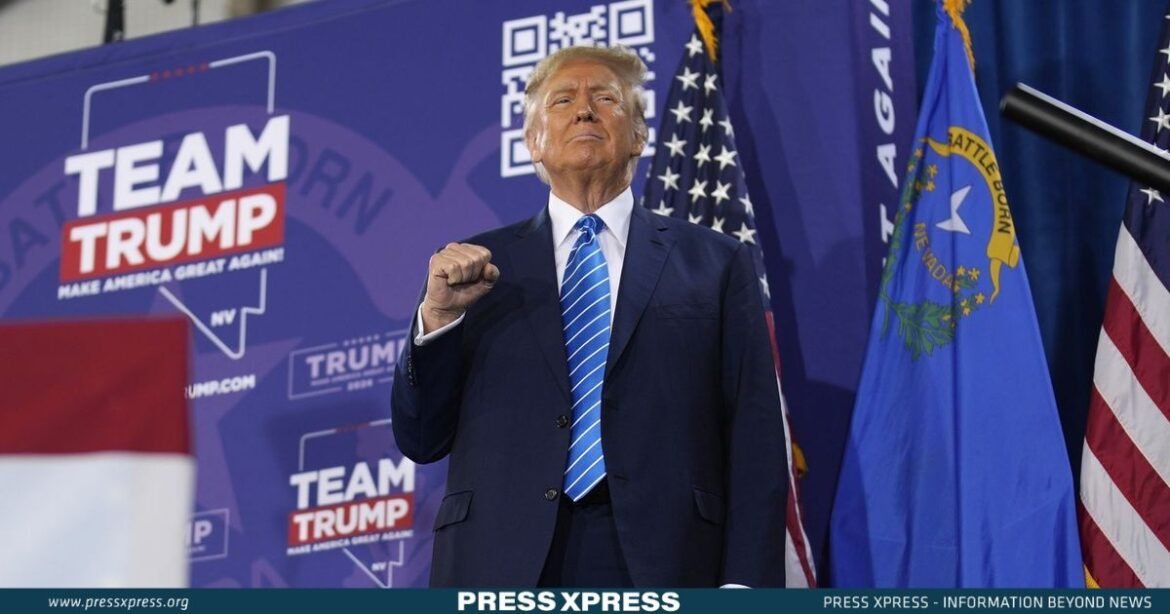Donald Trump left the White House as a pariah. He was a one-term Republican president who lost the election and was deserted by many in his party for denying the results and sparking a riot at the U.S. Capitol that made lawmakers run away.
Some of his Cabinet members had thought about ousting him from office by using the 25th Amendment. He was banned from social media and became the first president to face impeachment twice.
You Can Also Read: WHAT’S IN STORE FOR THE WORLD IF TRUMP RETURNS TO THE WHITE HOUSE?
Three years later, Trump is close to an astonishing comeback. He has won the first two 2024 nominating contests by huge margins and is ahead in the polls in the next states. He is the first nonincumbent Republican to win both Iowa and New Hampshire, and he broke a record for the largest win in Iowa caucus history. He also won Republican presidential nominating caucuses in Nevada and the U.S. Virgin Islands, advancing towards becoming his party’s White House contender in a probable general election rematch with U.S. President Joe Biden in November.”
Trump wins Nevada and Virgin Islands caucuses
On February 8, as anticipated, Donald Trump secured the Nevada caucuses, while his Republican colleague Nikki Haley was absent from the ballot.
The Nevada election has been tainted by the perplexing manner in which it has unfolded, dividing votes between two events on two separate days.
Nevertheless, Nevada Republicans expressed their preference for Trump to be their candidate against President Biden in November’s general election, which is accessible to all voters.
Trump not only prevailed in the caucuses, but his backers also cast a decisive protest vote against Haley in the primary two days before.
In the primary — which excluded Trump from the ballot — Haley obtained around 23,000 votes, while the option for “none of these candidates” got more than 47,000 votes.
Nevada Republicans had the opportunity to partake in both the primary and the caucuses. One notable Trump supporter, Nevada Gov. Joe Lombardo, said he intended to vote against Haley in the primary and to caucus for Trump. Evidently, many other Trump supporters did likewise.

Trump wins Virgin Islands caucuses
Earlier, Trump also prevailed in the Virgin Islands Republican caucuses, securing all four delegates offered from the U.S. territory in a competition that Haley had campaigned in.
He got 182 votes, or 74% of the 246 votes cast there, defeating his final opponent in the Republican race, Nikki Haley, who got 26% support with 64 votes.
“I want to thank you all. We had a tremendous victory. We expected to win, but we didn’t expect to win by that much. You are incredible people I will never forget.”
– Donald Trump

Why Nevada is different?
The perplexing situation in Nevada — with both a primary and a caucus — arises from a conflict between Republicans and Democrats in that state. Democrats in the Nevada legislature enacted a law in 2021 that switched the state from a caucus to a primary system.
But Nevada Republicans did not want to use a primary, and last year the Nevada GOP demanded to use a caucus. They got their way, but when the Nevada GOP also attempted to get the state primary scrapped, state officials denied it.
Members of Haley’s campaign minimized the result, saying they had “not spent a penny nor a bit of energy on Nevada” as they looked forward to South Carolina, where she was governor from 2011 to 2017.
Nevada: highly contested battleground
Despite the results in Nevada being insignificant for the Republican nominating race, the state will be a fiercely disputed battleground because its population can shift to either party and affect November’s presidential election.
In 2020, Biden beat Trump in Nevada by 2.4 percentage points. Opinion polls indicate a likely rematch between Biden and Trump in the state will be tight.
About 30% of Nevada’s population identifies as Latino or Hispanic on the U.S. Census, and Republicans are gaining some ground with these voters nationwide.
Nevada also has many possible swing voters: There are 768,000 registered as “nonpartisan,” more than those registered as either Democrat or Republican, based on the latest state figures.
What happens next?
Trump is still the most likely to get the Republican nomination. He got almost twice as many delegates as Haley after winning Nevada, with around 60 to her 17.
The nomination requires 1,215 delegates, but Trump could achieve that soon. The next race is the South Carolina primary on Feb. 24, then Super Tuesday on March 5. That day, 15 states will have a primary or caucus.
Haley’s chances of getting the nomination — which is already very slim — will be gone if Trump dominates in South Carolina and on Super Tuesday.
However, if the Republican Party rejects Trump for some reason, or if he is not allowed to run legally, the party would need another option. The more delegates Haley gets, the more she becomes the next choice for the nomination.


